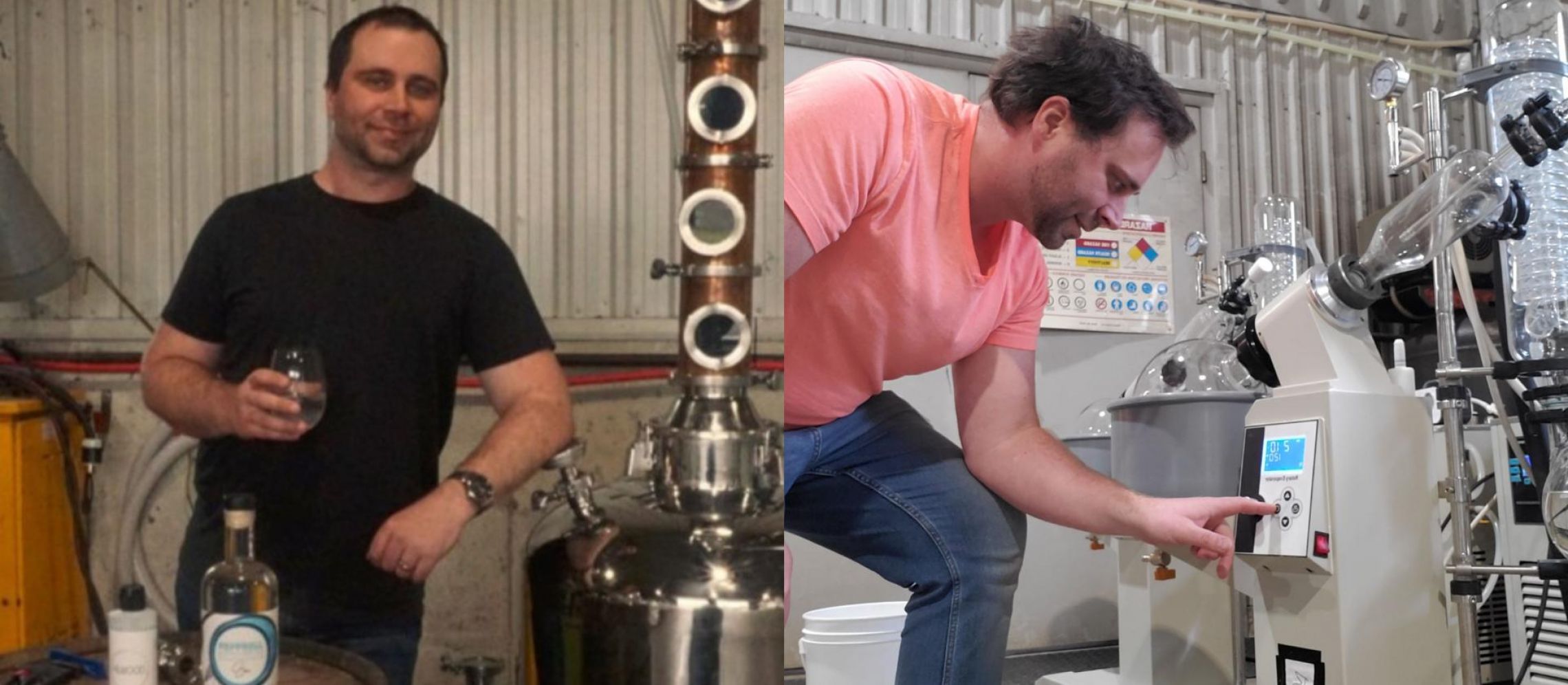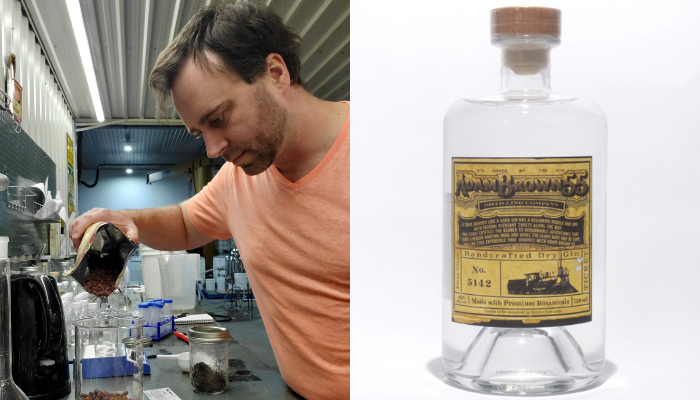Registration Opens
01 May 2024
Judging
Date
26 & 27 March 2025
Winners Announcement
22 April 2025

Josh Cormier’s journey into the world of distilling began with a backpacking adventure through Europe at the tender age of 19. His experiences, particularly in Spain, where budget constraints led to the discovery of inexpensive wine, ignited a passion for alcohol production and appreciation. To deepen his knowledge, he worked at a brew-your-own wine store and later pursued a degree in philosophy. However, his unique set of skills in alcohol production and his ever-growing interest in the craft eventually steered his career towards a different path.
Currently, as the sole distiller at Adam Brown 55 Distilling in Moorefield, Ontario, Canada, Josh is at the forefront of modern distillation techniques and flavor innovation. The distillery's commitment to vacuum distillation allows him to meticulously preserve the delicate aromas of botanicals while ensuring a hands-on, lengthy production process. His typical day involves operating multiple stills for both production and experimentation, using problem-solving, creative thinking, and unwavering attention to detail.
In an industry dominated by giant conglomerates, Josh represents the essence of craft distilling by focusing on quality, creativity, and clear communication. His mission is to provide unique and exceptional spirits while navigating the challenges posed by the market's heavyweights. As a distiller, he constantly seeks objectivity, avoiding personal biases in pursuit of excellence. His dedication to the craft and his drive for innovation make him a noteworthy figure in the spirits industry.
I came to the alcohol industry after a backpacking trip through Europe when I was 19. A friend and I spent a good deal of time in Spain, being quite young and broke. We opted for the cheapest alcohol we could get our hands on in the evenings, this came in the form of a 1-liter tetra pack of wine for 0.45 euro. After returning from that trip, newly interested in wine, I got a job at a brew-you-own wine store, learned a little bit about fermentation, and was interested in trying to make my alcohol. I soon went away to university for a degree in philosophy, because of my experience I got a part-time job at a very good regional brew-your-own shop on the east coast of Canada. Once I finished my degree, I realized I had a degree in a subject for which no one was hiring. My only other marketable skill was some knowledge of the production and appreciation of alcohol. I decided to further my education, moving to the west coast of Canada, by taking classes through the WSET (Wine and Spirits Education Trust). I did that for a while, while I was pursuing level 4, a diploma, I got accepted into Brock University's Viticulture and Oenology program. I moved to Ontario, learned about winemaking, and started making alcohol professionally. From there, I have spent time working in vineyards, wineries breweries and now call the distilling industry my home.
I am the head (and only) distiller at Adam Brown 55 Distilling in Moorefield, Ontario, Canada (not too far from Toronto). We use more modern approaches to spirit production and are heavily invested in researching new flavors and novel ways to make them. While we have a few more traditional style pot stills on site we have switched to production that is entirely vacuum still-based, this makes production lengthy and very hands-on. On a given day I will often be operating 2 stills for production and 1 still for experimentation. I will do a botanical maceration in the morning separate the alcohol and botanicals then run the alcohol through the vacuums. This allows us to preserve the beautiful delicate aromas of the botanicals without destroying or changing them through heat. I never distill our products higher than 30 degrees C. Where traditions still give flavors that are more similar to making strawberry jam from strawberries (because of the high heat) vacuum distillation will preserve the fresh strawberry flavor.
I have a passion for good food and drink. I also like physical jobs that require a lot of thinking and creativity, distilling seemed like a natural expression of these interests.
Problem-solving, creative thinking, and attention to detail.
A lot of people are very interested in what goes into making alcohol. A distiller holds a lot of interesting and useful information, but communication is the key. A lot of the information that exists in alcohol production can be mired in jargon and technical language the best distillers I've met who can help push marketing are the ones who can cut through all the BS and explain in simple terms how spirits are made and why the spirit they make is unique. Like so many things in life clear and thoughtful communication goes a long way.

Image Source: Josh Cormier & Liquor Control Board of Ontario (Ft. Adam Brown 55 Distilling)
Someone who can understand the industry and products from a professional point of view while keeping in mind they are making products for the public and not a niche market of weird alcohol geeks.
Cutting through personal bias. Creating anything is hard and it's very easy to be easy on yourself and think that what you have made is the cat's ass, on top of that most people you know are biased in your favor and therefore will like what you make no matter what. Having an objective palate is extremely important to make sure the products you make are of the highest possible quality. I'm constantly trying to trick myself and do blind tastings on myself to limit the degree of bias I insert into the production.
Domination by enormous multinational conglomerates. There is no way craft distillers can compete on pricing or marketing with the big brands. The technology and education are now generally quite good so making good quality spirits is not hard for someone who knows how to use the equipment properly and has decent training what this means is it is a highly competitive industry in terms of quality, so the next thing to compete on would be price and advertising, which is not possible for smaller players. This leads to a lack of novelty and innovation on the shelves. Because the big guys are so much more successful at marketing but generally much more conservative in experimenting with new ideas there is a long uptake from small distillers' creativity to something the average person will be able to find on their liquor store shelf.
Given that philosophy still largely focuses on this question to this day without making any real progress in the last 2,500 years or so, I doubt very much I'll be able to provide any meaningful contribution but I'll have a go.
Examine and think about all your actions, try and figure out what you have control over and what you need to just let happen. Come to peace with the fact that in this life you have control over very little and that is just fine. Observe life but don't get too fussed about what happens, observe your emotions but don't let them control your reactions, consider them closely and move slowly. Enjoy experiences that bring you joy, be in the moment when you talk with loved ones, and be in the moment when you drink a good scotch.
Scotch, or any good whisky listening to Philip Glass reading philosophy.
Drink by Iain Gately, Liquid Intelligence by Dave Arnold
Blending takes an eternity for us. We distill all botanicals individually to various concentrations that then have to be blended and de-concentrated. At the end of the day, it is a pretty simple formula where all the botanicals get mixed together, we focus primarily on gin and then have the flavor concentration adjusted to where it needs to be. It's no different than following a cocktail recipe, but the consequences of an inaccurate measurement are much higher as such there are multiple layers of redundancy built into my measuring and blending procedure. I measure volumes twice and weigh everything once to make sure everything is consistent from batch to batch.
We have very little waste as a result of our use of vacuum stills, we get incredibly good returns on them. The waste that we do have is mostly water and we have worked with the township to develop a protocol for dilution and draining.
Probably more random flavorless low cal low carb vodka or something. The industry, at least where I am, is strongly geared toward flavorless alcohol. It's extremely hard for the local craft scene to break through in any meaningful way because of how the industry works here. Until there change in the laws that allow smaller businesses to thrive there won't be much change as a result of the craft scene.
[[relatedPurchasesItems-63]]